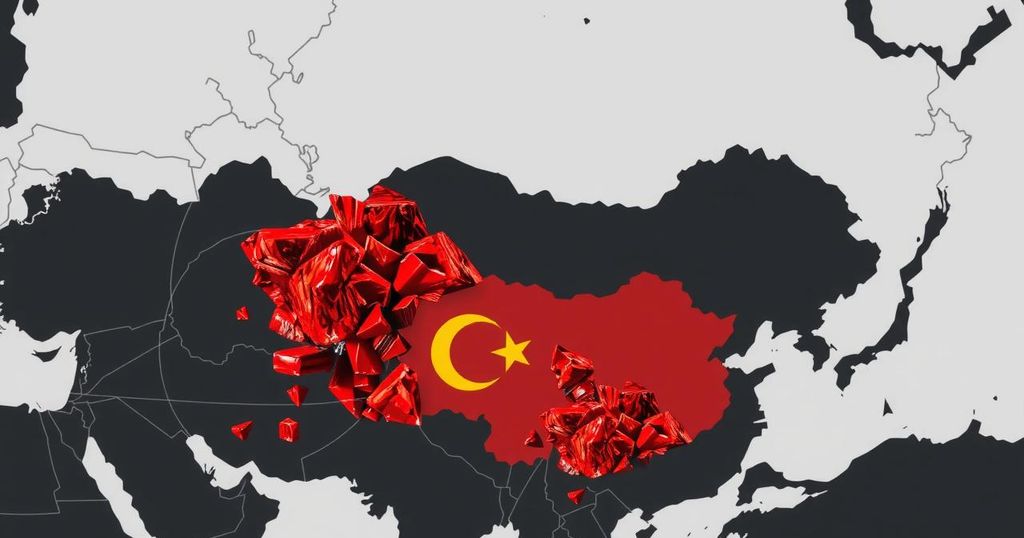Turkey Enters Minerals Security Partnership Amidst Global Competition for Critical Minerals
Summary
Turkey has joined the Minerals Security Partnership (MSP), collaborating with the US and EU on critical minerals production. The MSP aims to diversify the global supply chain dominated by China. Turkey’s substantial rare earth reserves in Eskisehir have attracted international attention, prompting negotiations with both China and Western nations. The EU’s initiatives to support Turkey’s mineral sector highlight the importance of rare earth elements in addressing growing technological demands. The future of Turkey’s partnerships will significantly influence its role in the global minerals market.
Turkey has officially joined the Minerals Security Partnership (MSP), collaborating with the United States, the European Union, and other nations to bolster the production of critical minerals and rare earth elements. An announcement from the US State Department confirmed Turkey’s membership in the MSP forum, with further details expected soon. Rare earth elements, crucial for various technological applications, such as smart device screens and electric vehicle batteries, are the focus of the MSP, which consists of 14 countries and the EU. Established to counter China’s substantial dominance in this critical sector, the MSP was created to help diversify the global supply chain of these essential minerals. In 2022, Turkey revealed a significant discovery of rare earth element reserves in Eskisehir, reportedly the second-largest in the world, with a deposit of 694 million tonnes. While independent verification remains sparse, this find has attracted global attention, particularly from China, which currently oversees over 70% of the rare earth market. Turkish officials aim to produce significant quantities of rare element oxides, alongside other minerals vital for various industries, including nuclear technology. Furthermore, membership in the MSP presents an opportunity for Turkey to seek investments and technical assistance from Western entities as it develops the necessary infrastructure for mineral extraction and refining. Notably, Turkey has been negotiating with China regarding these rare earths, with Energy Minister Alparslan Bayraktar scheduled to visit China to discuss ongoing projects. However, Turkish sources indicate a preference for establishing domestic production capabilities, urging China to invest in Turkish infrastructure to ensure the final products are manufactured in Turkey rather than being exported raw. Recognizing Turkey’s strategic position, the EU is keen on strengthening ties and has initiated a €12 million project aimed at enhancing Turkey’s rare earth minerals ecosystem. This initiative includes bolstering research facilities and facilitating training for local businesses. The EU recently emphasized the significance of rare earth elements in the contemporary industrial landscape and Turkey’s potential as a leading player in this realm. As demand for these materials is projected to surge, the EU’s offer for collaboration is seen as a strategic maneuver to reduce dependency on Chinese sources. Turkish officials have expressed a willingness to explore partnerships beyond China, insisting that any agreement with Beijing must include provisions for local processing capabilities.
The global market for critical minerals, particularly rare earth elements, is marked by rising competition primarily between Western nations and China, the latter of which dominates this sector. As countries strive to secure their supply chains amidst geopolitical tensions, initiatives like the Minerals Security Partnership (MSP) have emerged to facilitate collaboration among producing nations. The relationship between Turkey and China reflects broader strategic interests in controlling rare earth resources, with Turkey’s recent discovery of significant reserves heightening its importance in global mineral supply chains. The EU’s interest in Turkey is underscored by its need to diminish reliance on China and foster local production capabilities, particularly as the demand for such minerals continues to escalate.
Turkey’s entry into the Minerals Security Partnership symbolizes a pivotal step in its efforts to become prominent in the rare earth elements sector. As the global demand for these critical minerals rises, collaborations with Western entities may enhance Turkey’s production capabilities, ultimately allowing it to assert greater influence in the international market. The ongoing negotiations with China will profoundly impact the future of Turkey’s mineral strategy, especially regarding local processing versus export practices. Ultimately, this dynamic emphasizes the intricate interplay of geopolitical relations and economic interests in the competitive landscape of critical minerals.
Original Source: www.middleeasteye.net








Post Comment